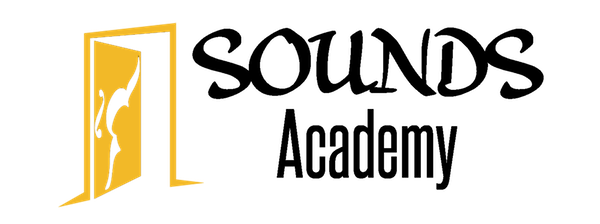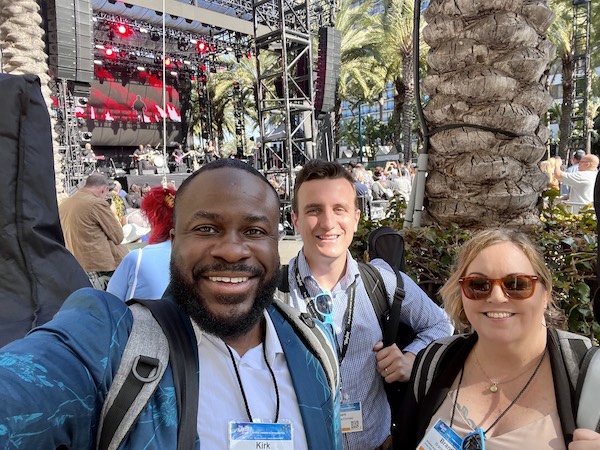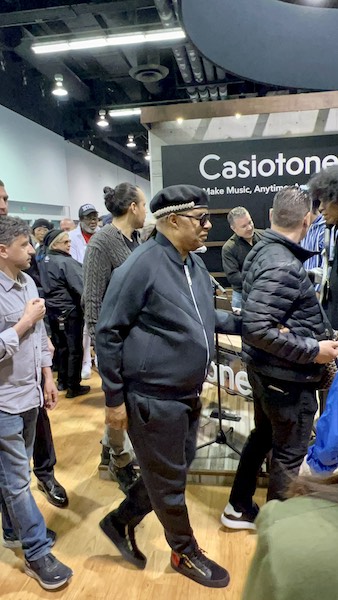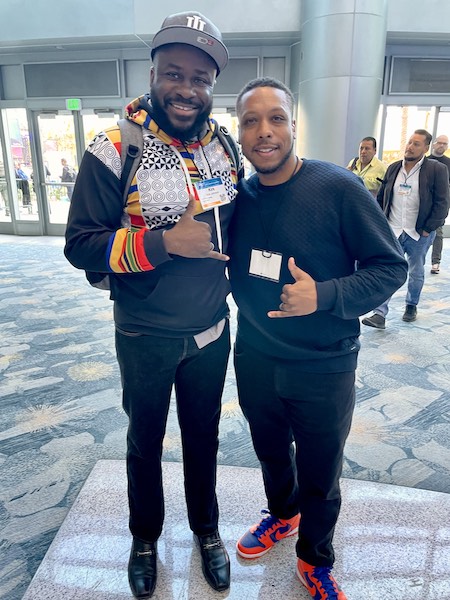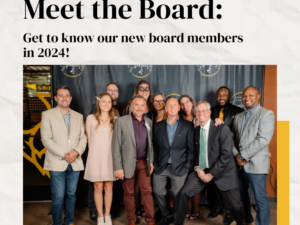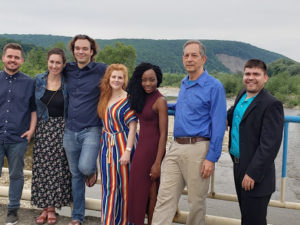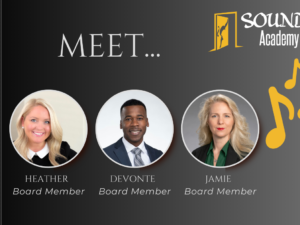8/27/23
In April I got to do something that I had never done before – bring my team to NAMM. NAMM (National Association of Music Merchants) is a conference that takes place in Anaheim and features workshops, professional developments, and exhibitions for musicians, music educators, non profit leaders – basically anyone in the Music Space/Industry.
I was able to bring Ben; our Program Manager and Brandy; our Bookkeeper/Secret Weapon. With the three of us there, we were able to accomplish so much more than if I had by myself. We had nightly dinners to discuss what we learned during the day. And boy did we learn a lot!

 to our friends from Casio) great reminders and new learnings. We learned key points such as:
to our friends from Casio) great reminders and new learnings. We learned key points such as:- Branding: The way that you brand yourself can dictate who you are able to connect with/to. Branding isn’t just what you put on the flier or website, but how you conduct yourself with the individuals which you serve.
- How Musicians Learn: In 2023 NAMM did a Gallup pole to learn how people learned music: 9% of people learned by being a part of a band or school orchestra. 30% learned how to play through lessons at school. 26% learned by taking private lessons. 13% were taught by a family or friend (let these number sink in)
- Recognition and Appreciation: Many points of valuing, rewarding, and connecting with people. (It’s always a great reminder that people is what keeps this “ship sailing”. We are nothing without our teachers, staff, parents, students, etc.)
- Music Learning: We learned a lot about DAWS (Digital Audio Work Stations) and how we can implement it with our students through classes in engineering, beat making, audio recording, etc.
But I would say that the greatest discussion for me came in a workshop called “Build, Sustain, & Expand Your Music Education Ecosystem”. The panel consisted of a leader of a school district, a leader of a College/University, and a leader from the American Music Educators Association.
We discussed issues such as the shortage of music teachers in the 2022 school year (20% of all public schools in the country reported in August (2022) that they were understaffed in music and arts (West Schools reported a 28%).
We referred to a 2019 study (https://www.nammfoundation.org/educator-resources/national-arts-education-status-report-summary-2019) and talked about how:
- 3,609,698 students in U.S. public schools do not have access to music education
- In looking at the 3,609,698 number, 17 states account for 1,472,000 students in 5,189 public schools without access to music instruction (and yes, ARIZONA is on that list)
- While 92% of students do have access to music education, a disproportionate number of students without access to music and arts education are concentrated in public schools in major urban or very rural communities; in public schools that have the highest percentage of students eligible for free/reduced-price meals; and in public schools with a student population that is majority Black, Hispanic, or Native American (remember this for later)
- Academic Achievement: High Expectations & Goals
- Cultural Competence: Attitudes, Awareness, Knowledge, & Skills
- Socio-political Critical Consciousness: Analysis through grade appropriate methods of political, economic, and social forces in society
We spoke of how these 3 key points can prepare students up for success and how we should be conscious of the students’ culture because their culture is meaningful and important. We need to realize that students walk into the classroom with their own “Cultural Competencies” so if they want to play something from their culture or something that they heard on the radio/YouTube/Spotify/Etc. then we should let them and meet them in the middle by giving them the opportunity to do so. For those who were in the “Classical Music” space – it was shared that we shouldn’t make them play scales, etudes, Bach, concertos, etc.
During this conversation, something in me wasn’t sitting well.
I raised my hand and stated (for the record) how I think that we should ABSOLUTELY tap into the culture of the students who we teach. I think that we should use other musical genres to influence student learning and help with motivation. Other “non traditional” elements can be use to help students learn the music that we are teaching them to play in school. I gave an example of how my teachers never told me to “hide” or “diminish” my Jamaican heritage in playing Bach – but rather they encouraged me to use it to figure out how that music could influence what I’m trying to play.
However, the thing that wasn’t sitting well with me was… Who is going to tell this to the universities which are accepting our students? How do we change the institutions (systems) that keep kids from being their authentic selves? How do we change the vision of the “gate keepers” that dictate who gets to “move” to the “next level”?
This touched a nerve for some and gave liberation to others. One person told a story of his own high school musical journey. He now realized that although the school had a high percentage of Hispanic students, there were none in the band. They were “encouraged” to participate in other activities. In other words – some “teachers” acted as “gate keepers” to how music education is learned and who gets to receive that education. And if we zoom out further, it looks like higher educational institutions, states, and our country are also acting as “gate keepers” with “a disproportionate number of students without access to music and arts education are concentrated in public schools in major urban or very rural communities; in public schools that have the highest percentage of students eligible for free/reduced-price meals; and in public schools with a student population that is majority Black, Hispanic, or Native American” (did you catch the full circle moment).
So now I want to figure out – now that we know these things, what are we going to do to make changes?
So as to not leave you on a “what just happened?” state of mind, I do also want to mention that I got to reconnect with a buddy and frat brother. I was going up the escalator and he was coming down – I was going to a workshop but when I saw the one and only JOEY FRENCH, I knew that I had to come back down to see him! We had not seen each other since college at Indiana University Bloomington. Since then, he’s had a wonderful career producing music, tv, movies, etc. and working with people like Timbaland, who has always been his favorite producer.
0 Comments
Leave a reply
You must be logged in to post a comment.
